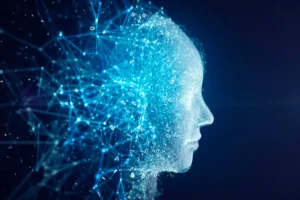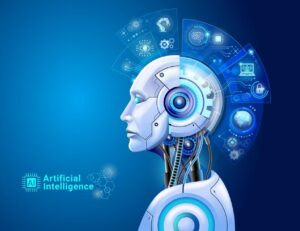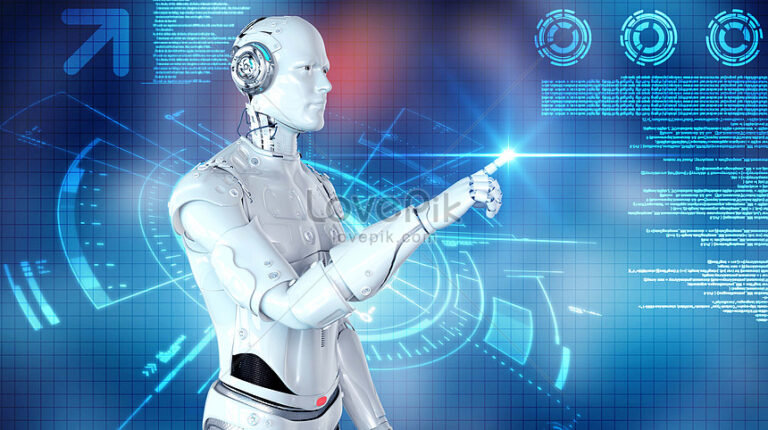
THE FUTURE OF ARTIFICIAL INTELLIGENCE (AI)

Artificial Intelligence (AI) used to be reserved for the population’s most brilliant scientist and isolated in the world’s top laboratories. Now, AI is available to anyone with an internet connection. Tools like ChatGPT, Voice.ai, Dall.E, and others have brought AI into our daily lives.
Artificial Intelligence (AI) has transformed from a futuristic concept into a reality that is now embedded in various aspects of our daily lives. From virtual assistants and recommendation algorithms to advanced medical diagnostics and autonomous vehicles, AI’s influence is pervasive. However, the journey of AI is far from complete. The future holds the promise of even more profound advancements, particularly in the realm of Artificial General Intelligence (AGI), which could reshape every facet of human existence. This exploration delves into the future of AI, focusing on its potential advancements, ethical and societal implications, and the challenges and opportunities that lie ahead.
AI today is primarily characterized by narrow or weak AI, which is designed to perform specific tasks such as image recognition, natural language processing, and predictive analytics. These systems have made significant strides, achieving superhuman performance in areas like chess, Go, and certain medical diagnoses. However, they operate within the confines of their programming and lack the ability to generalize knowledge or understand context in the way humans do.
WHAT IS AI?

Before delving into the future of AI, it’s important to first grasp what Artificial Intelligence (AI) is and where it’s currently at. “AI refers to the simulation of human intelligence in machines programmed to think like humans and mimic their actions. This term is also applied to any machine that exhibits traits associated with a human mind, such as learning and problem solving”. Artificial Intelligence has steadily moved from science fiction to an integrated part of our daily lives revolutionizing how we interact with technology. At the core of this revolution is the ability of AI to perform tasks that typically require human intelligence. This includes everything from basic computational tasks to complex decision-making processes, mirroring and sometimes surpassing human capability.
AI FOR GOOD.
Advancements in AI are making a big difference in solving important issues that affect local and global communities. AI is already being used in new ways to detect deforestation, watch emissions, improve disaster response, and enhance health care delivery.
In creative industries, it can offer new tools for artists and designers. In business, it can automate routine tasks, like generating reports or answering common customer questions. In education, it can personalize learning experience and content.
RECENT ADVANCEMENT IN AI TECHNOLOGY.
The Rise of Artificial General Intelligence (AGI).
AGI, often referred to as “strong AI,” represents a level of machine intelligence that can understand, learn, and apply knowledge across a wide range of tasks, similar to human cognitive abilities. Unlike narrow AI, AGI would not be limited to specific functions; it could autonomously adapt to new environments, solve novel problems, and even exhibit creativity and emotional understanding.
The development of AGI is a monumental challenge that requires breakthroughs in several areas:
- Machine Learning: Current AI relies heavily on deep learning, a method that involves training large neural networks on vast amounts of data. For AGI, more advanced learning algorithms that mimic human learning such as unsupervised and reinforcement learning will be crucial.
- Cognitive Architectures: Researchers are exploring cognitive architectures that simulate the human brain’s structure and function, aiming to create machines that can think and reason like humans.
- Quantum Computing: The computational power of quantum computing could accelerate the development of AGI by enabling the processing of complex problems that are currently infeasible with classical computers.
IMPLICATION OF AGI
- Economic Transformation: AGI could revolutionize industries by automating complex tasks, leading to increased productivity and efficiency. However, it could also disrupt labor markets, as machines take over jobs that were previously thought to require human intelligence.
- Social Impact: AGI could significantly impact social structures, potentially widening the gap between those who control advanced technologies and those who do not. The ethical distribution of AGI’s benefits will be a critical issue.
- Ethical and Moral Concerns: AGI could challenge our understanding of consciousness, agency, and morality. Ensuring that AGI systems act in alignment with human values will be essential to prevent unintended consequences.
ETHICAL CONSIDERATION IN AI DEVELOPMENT
As AI becomes more powerful, ethical considerations are becoming increasingly important. The development and deployment of AI raise several key ethical issues:
- Bias and Fairness: AI systems can inherit biases from their training data, leading to unfair outcomes in areas like hiring, law enforcement, and lending. Developing fair and unbiased AI is a critical challenge.
- Accountability and Transparency: As AI systems make more decisions, it is essential to ensure that they are transparent and that there is accountability for their actions. This is particularly important in high-stakes areas like healthcare and criminal justice.
- Privacy: AI systems that process large amounts of personal data raise significant privacy concerns. Striking the right balance between innovation and privacy protection will be crucial.
- Autonomy and Control: As AI systems become more autonomous, questions arise about who controls them and how they should be governed. This is particularly relevant in areas like military applications and self-driving cars.
Societal Impact of AI
In today’s fast paced world, many of us worry about the impact of AI on our Jobs. As technology advances, it can feel like we are in a constant race to keep up.
- Employment and the Workforce: In today’s fast paced world, many of us worry about the impact of AI on our Jobs. As technology advances, it can feel like we are in a constant race to keep up. AI-driven automation is likely to lead to significant changes in the workforce, with some jobs being replaced by machines and new types of jobs being created. Preparing the workforce for these changes through education and retraining will be essential.
- Healthcare: AI has the potential to revolutionize healthcare by enabling more accurate diagnoses, personalized treatment plans, and even new drug discoveries. However, it also raises questions about access to care and the role of human judgment in medical decision-making.
- Education: AI could transform education by providing personalized learning experiences and making education more accessible. However, it could also exacerbate existing inequalities if not implemented carefully.
- Social Interaction: AI-powered social robots and virtual assistants are beginning to change the way we interact with technology and each other. This raises questions about the nature of human relationships and the role of AI in our social lives.
CONCLUSION
The future of AI holds incredible promise, but it also poses significant challenges. The development of AGI could revolutionize industries, transform society, and address some of the world’s most pressing problems. However, it also raises profound ethical and societal questions that must be addressed. As we move forward, it will be essential to develop AI in a way that is responsible, ethical, and aligned with the values and interests of humanity. By doing so, we can harness the power of AI to create a future that is both innovative and equitable, ensuring that the benefits of AI are shared by all. The future of AI is not just a technological challenge but a societal one. It requires careful consideration, collaboration, and foresight to navigate the complexities and realize the full potential of this transformative technology. As AI takes over more routine tasks, our ability to think becomes crucial. AI is great for Jobs that involve bolting data or following rules, but it cannot come up with new ideas or solve problems that are not clearly defined. This is where human creativity becomes essential. Creativity drives innovation and problem solving across all sectors. While AI can make some tasks easier, it tends to standardize solutions, making many outcomes very similar. Human creativity helps us see beyond data, connect different ideas, and come up with different new solutions that AI might not find.



